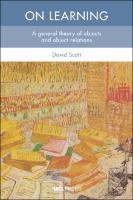On Learning
A general theory of objects and object-relations
Abstract
This is a philosophical work that develops a general theory of ontological objects and object-relations. It does this by examining concepts as acquired dispositions, and then focuses on perhaps the most important of these: the concept of learning. This concept is important because everything that we know and do in the world is predicated on a prior act of learning. A concept can have many meanings and can be used in a number of different ways, and this creates difficulty when considering the nature of objects and the relationships between them. To enable this, David Scott answers a series of questions about concepts in general and the concept of learning in particular. Some of these questions are: What is learning? What different meanings can be given to the notion of learning? How does the concept of learning relate to other concepts, such as innatism, development and progression? The book offers a counter-argument to empiricist conceptions of learning, to the propagation of simple messages about learning, knowledge, curriculum and assessment, and to the denial that values are central to understanding how we live. It argues that values permeate everything: our descriptions of the world, the attempts we make at creating better futures and our relations with other people.
Keywords
education; philosophy; concepts; ontology; objects; object-relations; critical realism; learningDOI
10.14324/111.9781800080027ISBN
9781800080003, 9781800080010, 9781800080034, 9781800080041, 9781800080027Publisher
UCL PressPublisher website
https://www.uclpress.co.uk/Publication date and place
London, 2021Imprint
UCL PressClassification
Philosophy and theory of education
Philosophy


 Download
Download